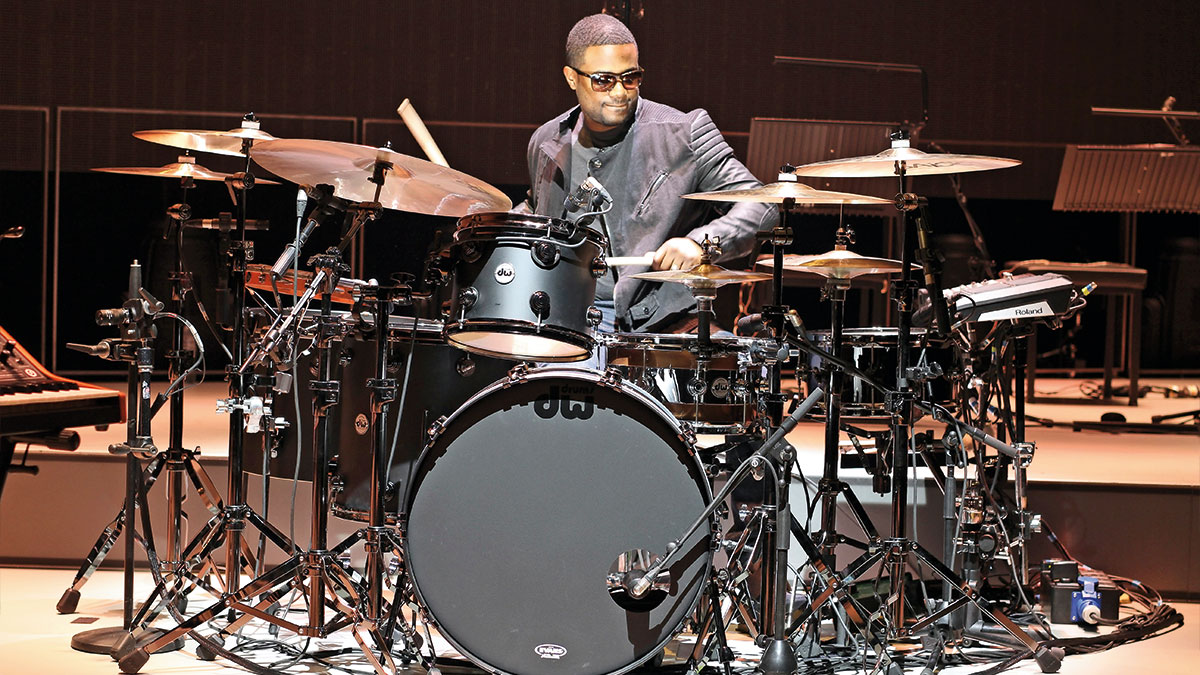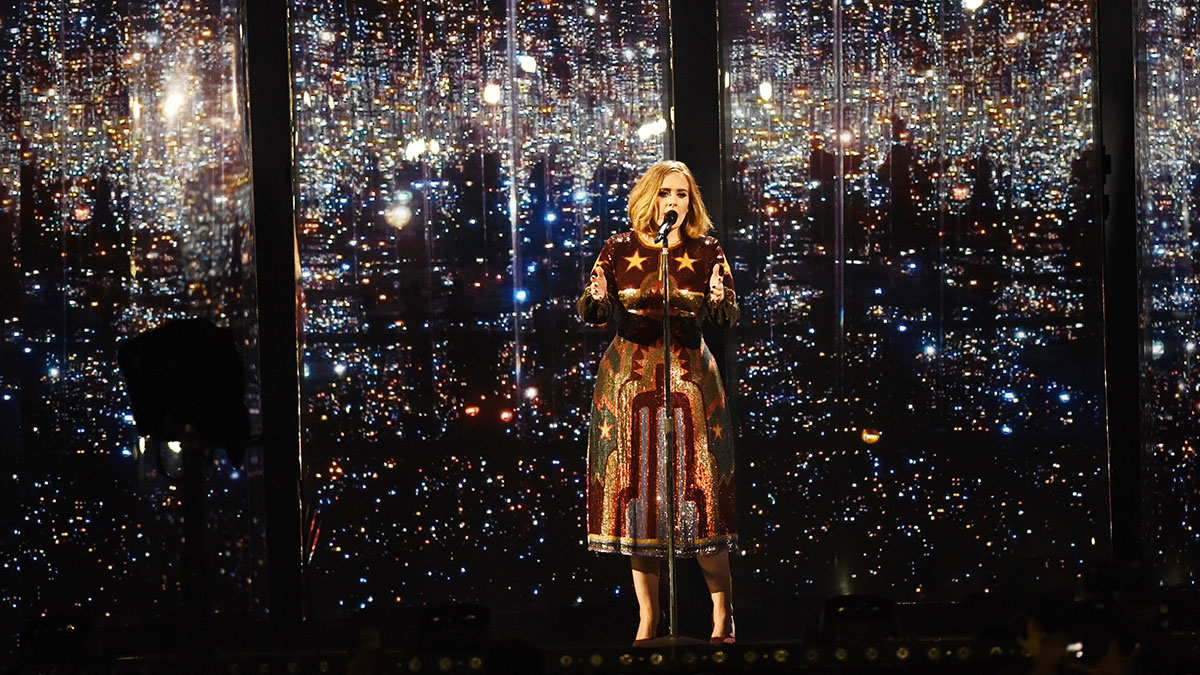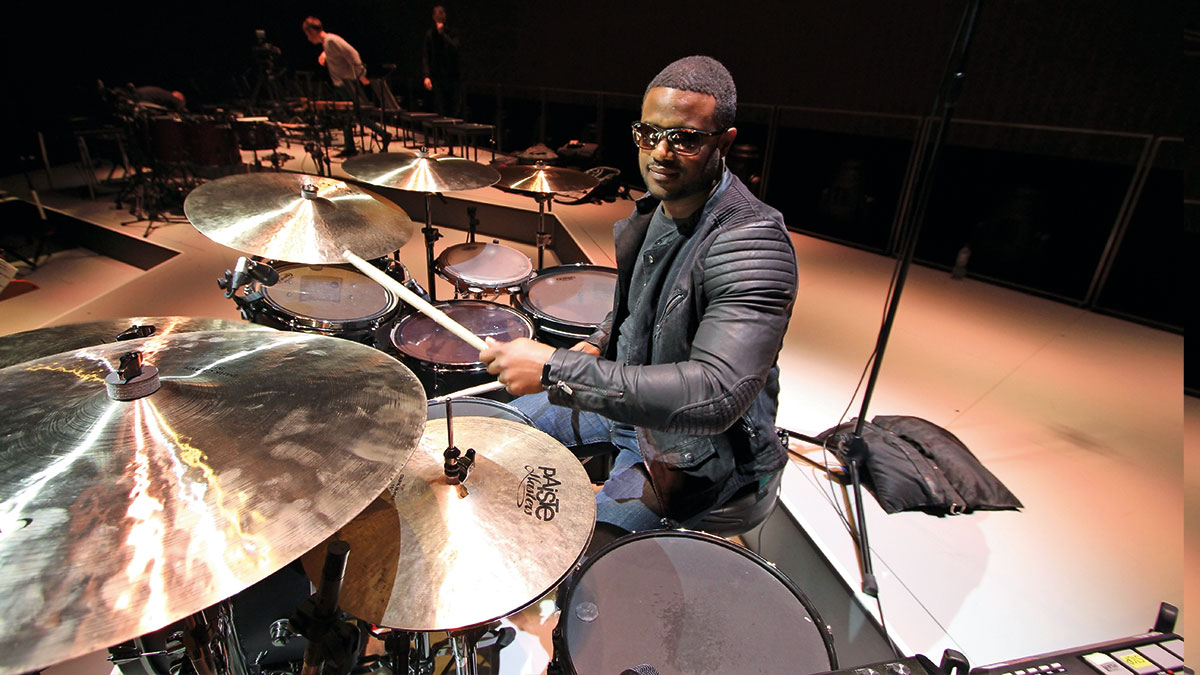Derrick Wright on cattle call auditions, gospel chops and backing Adele
Adele's go-to drummer on landing – and keeping – a mega gig

"You can play reggae, a little Latin, everything comes out of church"
What does it take to play drums behind the fastest-selling star of the 21st Century? Derrick Wright has been playing live with Adele for eight years and the gig is still just as moving as ever for the drummer himself.
“The first show in Belfast, we were doing ‘When We Were Young’ and I’m just sitting there listening,” says Wright. “I’m not paying attention. I’m just listening to her. ‘Wow, this is amazing,’ and next thing you know the percussion player Aaron is looking at me, like, ‘Hey man!’ I was just lost in her singing those lyrics.”
Born and raised in Brooklyn, New York, Wright grew up surrounded by music and musicians. His father, the Reverend Timothy Wright was a huge name in gospel. “They called him the Godfather of Gospel,” says Wright. “He started out playing in church, then writing music, then recording gospel album after gospel album, so all my brothers play too. It’s a musical family. I have four brothers, no sisters, just all boys.”
As a result of his dad’s reputation, Wright grew up watching some of the best gospel drummers in the world. “My father always had musicians coming by the house and so as a young kid I used to sit next to them and watch them, great guys like Gerald Heyward, Jeff Davis, some really serious cats. I’m sitting, watching them play, eating ice cream.” Now those church-honed chops have helped Wright to land one of the biggest gigs in the world.
Why are church drummers landing so many high profile gigs?
“I think it’s the discipline that you learn in church because you can go to church and it’s not just one particular style of music. You can play reggae, a little Latin, everything comes out of church. And you play with feeling. You’re not playing to a chart most of the time, you’re playing to a feeling. There’s a thing called Devotional Service when somebody can just get up and sing at any time and sing anything, in any key, at any tempo and you’ve got to pick it up. So I think that’s the key, it’s that we know how to make it feel good, make the artist comfortable, hone in on our sound and make it feel right.”
"I played for Fabolous, then jump on a Toni Braxton gig, or Babyface, then I can jump on an Adele gig."
Did you listen to other music besides gospel music growing up?
“My father wasn’t just a singer-songwriter or pastor, he was a musician so sometimes he would play some Earth, Wind And Fire in the house. He was a cat, he played keys so sometimes he’d play Gap Band. The Gap Band was his band, that and James Brown. I grew up listening to everything. There used to be a TV show called Fraggle Rock, I used to listen to that and play to that. I would play Little Shop Of Horrors, I ran that VHS until it broke just practising to that. When I got to be around 17, I went to a club, Café Wha?, that’s where Jimi Hendrix and everybody came out of. I met the owner there, named Noam. I wasn’t even supposed to be there because I was under-age, so I came in with some friends and I played drums. He asked me how old I was and I lied to him, I said I’m 18. He found out I was 17, he said, ‘When you come back when you’re older, you’ve got a job.’
“So I went back and he hired me and I learned so much from this man and just being around all the musicians there because they were playing anything from Latin, Caribbean, to Brazilian, to funk, to pop. It was amazing and it was six nights a week. I officially started there around 19, 20. My audition, he gave me 190 songs. He said, ‘Can you learn this and you start in two weeks?’ It was a challenge, but I was already trained from being in church. This is what we do, you listen and you play it, and so he was amazed that I came back in a week and I knew it. He’s like, ‘You know all the songs?’ I was like, ‘Yeah, let’s do it.’ We had a great relationship from there.
"I worked there for almost 10 years, just getting all the knowledge, how you lay back off the kick in reggae, really getting particular about the authenticity of music. That’s why I feel like I can do a rap gig, jump on a hip-hop gig, because I played for Fabolous, then jump on a Toni Braxton gig, or Babyface, then I can jump on an Adele gig. I owe a lot of that to Noam who is the owner of Café Wha?.”

"I think she liked me and I've been here ever since."
What was your first show with Adele?
“Eight years ago, Saturday Night Live, that was the first show. It was at the very beginning stages of 19. The drummer Donavan [Hepburn], he lives out here in London, he didn’t come to the us. I was just thinking I was going to be filling in. I was recommended by Miles Robertson, the keyboard player, and I guess one thing led to another. I think she liked me and I’ve been here ever since.
“It’s a great relationship. I have so much respect for Adele just seeing her come from 19, where I came in, to where it is now, it’s just incredible. I never grew up with an artist like that. Some people get on while the artist is already high up but to go through the steps of seeing somebody grow into the mega-star that she is now, it’s amazing and it blows my mind because she’s still so down-to-earth. She is a great person and I’m honoured to work for her and honoured to call her boss, even though she’s younger than me. She’s 27, I’m almost 37. Dang! But she’s the bomb, I love her.”
"She’s 27, I’m almost 37. Dang! But she’s the bomb, I love her.”
What’s the key to the gig as a drummer?
“Staying true to the music. When I first started playing, I was still chopping, not really listening to the sounds. I remember one show, it may have been North Sea Jazz Festival, we start playing and we’re chopping. I’m like, this is not true to the music. That changed my mind-set when I started listening to the music, hearing her vocals and what she’s saying.
"We shouldn’t step on that, as musicians we should never step on the artists. Always give them room for the vocals and to get the message across. It’s very important as a musician, as a drummer, to pick your placements very wisely. You don’t want to chop when they sing something that’s very important to the song because it makes you look like it’s all about you.”

"It's always on the artist to make the decision, not the musicians."
Do you strive to recreate the studio versions of the songs live?
“It’s a live band but we stay authentic to the music. I listen to the stems, I listen to what the drummer played on the record, I get that sent to me by itself. All right, cool, that’s how the snare sounds. I want to try to tune as close as I can to the snare they used.
"Everybody comes together, puts their two-cents in and it makes an amazing show. The main MD is Adele."
"That’s how authentic I want to stay, so when she’s hearing it, she’s not hearing anything different. It’s not like, ‘That wasn’t on the record, that’s weird.’ It’s really making the artist comfortable. If the artist wants it a little different, that’s when you can bring your colours into it. It’s always on the artist to make the decision, not the musicians.”
Is there an MD on the show?
“It’s a group effort and there has not really been an MD for Adele. Everybody comes together, puts their two-cents in and it makes an amazing show. The main MD is Adele. She’s a musician, so she can turn around and be like, ‘No, play it like this.’ She actually knows how to play, she plays piano, guitar, and she plays drums. It makes your job a whole lot easier. Honestly it makes life easier. It’s not just that she knows how to play, she sings her heart out and it’s beautiful. It makes your work easy. It’s not even work, it’s fun now.”

"I'm very attentive to what I need to do, I pay attention."
What’s in your set-up?
“I signed with DW at the beginning of the year. I have two rigs. I play drums off-stage too. We have two sound systems and I’m the only acoustic instrument onstage, everybody else is playing through dis [direct inputs], no amps on stage. She has another stage, the B stage, which is in the middle of the arena, so there are two PA systems. They were running into problems in production rehearsals where they were hearing drums from the main stage because that’s the only acoustic instrument.
“They were getting a delay from the house, so when people in the expensive seats turn around to look at that stage [B stage], they hear music coming from this way, but drums coming from this way. They said to play electric [drums] and Adele was like, ‘Nah, this is a not a Beyoncé gig.’ So they set up [a second kit] in my dressing room.
“I just walk back there and play my drums. There’s no monitor. I have my in-ears. Every venue it changes. My dressing room could be 45 seconds [away from the stage]. If it’s really far away, they build a room with a couple of curtains right behind the stage. so that’s why I have two rigs.”
Why did you choose walnut in your floor toms?
“It’s warmer. Simon, my drum tech, introduced me to it. I’d played DW before but I was always playing the maple, I didn’t know they had so many different voices. Man, they’ve got so much stuff. when I went to the factory, they’re really doing some cool things with different woods. It’s very scientific and it’s amazing. The walnut is really a warm tone, even if you just tap the wood you’re going to hear it.
"They said to play electric [drums] and Adele was like, ‘Nah, this is a not a Beyoncé gig.’"
“Cherrywood is the same thing. Cherrywood is something I’d want to venture into, because cherrywood has the top end but somehow it still has that low end. They’re setting the trend. When it comes to doing different woods, mixing woods, even the machinery they use, they’re the trailblazers.”
Why does Adele keep calling you back?
“I think that she’s happy with my sound. I’m very attentive to what I need to do, I pay attention. She knows my heart is for the music. I’m not a perfectionist but if I’m a basketball player and there are 10 seconds left on the clock, I want you to be comfortable to pass me the ball and know that I’m going to do the right thing with it. I think she can depend on me to do the right thing. Ten seconds left, pass me the ball, I got you.”
Images supplied by David Phillips, photographer and author of A Drummer's Perspective. For more information on David's new book, From The Riser: A Drummer's Perspective II, head here.